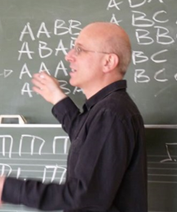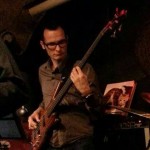Andrea Sangiorgio (En)

Contatti
- +39.338.8487703
- andreasangiorgio.mus@gmail.com
- formazione@centrodidatticomusicale.it
music educator, music teacher educator, researcher
Education
In March 2016 he gained a PhD at the University of Exeter, UK, with a qualitative research study on “Collaborative creativity in music education: Children’s interactions in group creative music making” (supervisor: Sarah Hennessy).
In 2010-11 he attended a Master of Science in Educational Research at the University of Exeter.
In 2006 he gained a Master’s degree in Literature and Philosophy (Ethnomusicology) at the University of Rome “Tor Vergata”, Faculty of Literature and Philosophy, with a thesis on “Orff-Schulwerk as Anthropology of Music”.
In 1999 he concluded his piano studies (10-year programme) in Italy at the Conservatorio “Rossini”, Pesaro.
In the years 1994-97 he specialized in the Orff-Schulwerk approach (B-Studium) at the Orff-Institute for Music and Dance Education, University “Mozarteum”, Salzburg, Austria, concluding his education with a thesis on group improvisation (“Kontinuum musikalischer Produktion und Interaktion im gruppenimprovisatorischen Kontext”).
Teaching, organisational and administrative responsibilities
Since December 2015 Andrea Sangiorgio is Professor für Elementare Musikpädagogik at the Hochschule für Musik und Theater, Munich, Germany (University of Music and Performing Arts Munich).
In July 2014 he has been appointed vice president of the International Orff-Schulwerk Forum Salzburg, the international organism which coordinates Orff-Schulwerk activities around the world.
—–
CDM Centro Didattico Musicale
Since 1997 up to 2022 he has been co-director (general organisation, management, and administration) of CDM Centro Didattico Musicale, a well-known private music school in Rome, where he also worked as music teacher until June 2015 (percussion, adults and children choir, ensemble music, music literacy).
From 1997 to 2010 he worked as an external expert for elemental music and dance education in various nursery and primary schools.
On behalf of CDM he has been from 2000 to 2010 coordinator for music and dance projects in nursery and primary schools.
Teacher education courses and seminars at CDM
Since 2002 he has been responsible for the teacher education courses of the CDM.
The school has received in 2006 the official recognition as an educational agency for school teachers from the Italian Ministry of Education.
With Valentina Iadeluca he is the organizer and director of a one-year course on Orff-Schulwerk – Elemental Music and Dance Education for music teachers who work in nursery and primary schools (270 hours). Since 2007 the Orff-Schulwerk course is organized in collaboration with the University of Rome “Tor Vergata” (120 hours).
In the context of the Course his teaching subjects range from movement, to voice, to instruments, to music literacy, to children’s musical creativity. In particular, he supervises student teachers in their placement in nursery and primary schools and in writing short theses about their initial teaching experiences.
Artistic-educational projects with CDM
From 1997 to 2015 he has been the conductor of the Coro Raro, an adult amateur choir focused on multicultural and ethnic vocal traditions.
From 2005 to 2007, together with other CDM colleagues, he has collaborated with the Accademia Nazionale di Santa Cecilia, Auditorium Parco della Musica (the biggest concert hall in Rome) in the realisation of many concerts for and with children 3-14 years old.
Besides a number of educational concerts realised in Italy, together with other CDM colleagues he organised and presented some performing groups of CDM pupils in the context of international events, such as:
- Symposium Orff-Schulwerk 2006, Salzburg, Austria – performing group: ‘Alpha4’, specialised on the use of Orff-instruments. An excerpt of the performance is in the DVD accompanying the book of the Symposium proceedings: Haselbach, M. Grüner, & S. Salmon (Eds.), In Dialogue. Elemental Music and Dance Education in Interdisciplinary Contexts. Documentation Orff-Schulwerk Symposium, Salzburg 2006. Mainz: Schott.)
- XXVI World Conference for Music Education, ISME 2004, Tenerife, Spain – performing group: ‘Tactus Percussion Orchestra and the Girls’ Choir’, a group of children 13-19 years old
- XXV World Conference for Music Education, ISME 2002, Bergen, Norway – performing group: ‘Tactus Percussion Orchestra’, a group of children 11-15 years old
Thanks to his long-lasting relationship with the Orff-Institut, Salzburg, the CDM Centro Didattico Musicale has become in 2011 an “Associated School” of the Orff-Schulwerk Forum, Salzburg.
Experiences in the field of teacher education
Through many courses throughout Italy as well as abroad (Austria, Germany, Spain, Finland, France, Russia, Lebanon, United Kingdom, Ireland, South Corea, Czech Republic, China, Taiwan, Switzerland, Iran, Turkey, Australia, Greece, US, Brazil, The Netherlands) he has been very active in the field of teacher education both for music teachers and classroom teachers, mainly on the subjects:
- Elemental music and movement education (Orff-Schulwerk approach)
- Ensemble music for percussion instruments
- Group improvisation and musical creativity
- Cognitive aspects of music learning (including Edwin Gordon’s Music Learning Theory)
Among the most relevant international achievements:
- July 2016: Orff-Schulwerk Symposium and Summer Course (Orff Institute, Salzburg, Austria)
- In January 2012 he has been Guest Presenter at the Biannual Orff-Schulwerk Conference “Voices of the Swan 2012. Creative Music and Movement Education”, organised by WAOSA West Australian Orff Schulwerk Association, Perth, Australia.
- In March 2009 the Orff-Institute, Salzburg, has invited the CDM Centro Didattico Musicale, namely Andrea Sangiorgio and Valentina Iadeluca, to present in a guest course the main features of the music and dance projects it carries out in nursery and primary schools in Rome and in Italy. In July 2011 in the context of the Orff-Schulwerk Symposium, Salzburg, they have presented the music projects in schools that the CDM has been implementing in schools of Rome in the last decade.
- Within the works of the 28th ISME Conference in Italy, in July 2008 he has been Host Chair of the XI International Seminar for Community Music Activity that has taken place in Rome at the Auditorium Parco della Musica in collaboration with Accademia Nazionale di Santa Cecilia.
- In July 2006 he has been a presenter at the Symposium Orff-Schulwerk in Salzburg, where he introduced to the international Orff community Edwin Gordon and his Music Learning Theory, furthermore illustrating in a workshop the possibilities of an inclusion of this cognitive approach to music learning within the pedagogical concept of the Orff-Schulwerk.
Publications
- Sangiorgio, A. (Ed.). (2023). Creative interactions. Creative learning, creative teaching, and teaching for group creativity in music education. Open Access Book. University of Music and Theatre Munich. URN: https://nbn-resolving.org/urn:nbn:de:bvb:m29-0000010661
- Sangiorgio, A. (2023). Tradition and creativity combined: Undergraduate students’ use of Western classical music as a source of ideas for collaborative improvisation and composition. In A. Sangiorgio (Ed.), Creative interactions. Creative learning, creative teaching, and teaching for group creativity in music education (pp. 167-183). Open Access Book. University of Music and Theatre Munich. URN: https://nbn-resolving.org/urn:nbn:de:bvb:m29-0000010661
- Sangiorgio, A. (2022). Creative group work as a central pedagogical strategy in the Orff-Schulwerk approach. Orff-Schulwerk International, 1(1), 27-33.
- Sangiorgio, A. (2020). Spiel. In M. Dartsch, C. Meyer, & B. Stiller (Eds.), EMP kompakt. Kompendium der Elementaren Musikpädagogik. Teil 1 Lexikon (pp. 530-536). Esslingen, Innsbruck, Bern-Belp: Helbling.
- Sangiorgio, A., & Mastnak, W. (Eds.) (2020). Creative interactions. Dynamic processes in group music activities. Munich: University of Music and Performing Arts. Open Access Book. URN: https://nbn-resolving.org/urn:nbn:de:bvb:m29-0000007200
- Sangiorgio, A. (2020). A manifesto for creative interactions in music education. In A. Sangiorgio, & W. Mastnak (Eds.), Creative interactions. Dynamic processes in group music activities (pp. 7-22). Munich: University of Music and Performing Arts.
- Sangiorgio, A. (2019). Creative group work as a central pedagogical strategy in the Orff-Schulwerk approach. Orff Times, 40(1), 3-8.
- Sangiorgio, A. (2018). Working with special populations: The potential of the Orff-Schulwerk approach. In B. Haselbach, S. Salmon, M. Grüner, A.M. Kalcher (Eds.), Orff-Schulwerk Heute n.99 (Winter 2018, pp.13-21). Salzburg: International Orff-Schulwerk Forum Salzburg & Universität Mozarteum Salzburg, Department für Musik- und Tanzpädagogik – Orff-Institut.
- Sangiorgio, A. (2018). The polarity “cooperative vs collaborative” as a conceptual tool to observe young children’s creative interactions in group music making. ÍMPAR – Online journal for artistic research in music. Vol. 2, Nº 1, 2018 Music for and by children, 3-18. DOI: https://doi.org/10.34624/impar.v2i1.799
- Sangiorgio, A. (2017). Opportunities and challenges of encounters between Orff-Schulwerk and Modern Arts. In M. Grüner, B. Haselbach, & S. Salmon (Eds.), Orff-Schulwerk Heute n.97 (Winter 2017, pp.19-22). Salzburg: International Orff-Schulwerk Forum Salzburg & Orff-Institut für Elementare Musik- und Tanzpädagogik. (download)
- Sangiorgio, A. (2016). Collaborative creativity in music education: Children’s interactions in group creative music making. PhD thesis, Exeter University, UK. Available at http://hdl.handle.net/10871/20648
- Sangiorgio, A. (2014). Orff-Schulwerk: relationships between practice and theory. In M. Grüner, B. Haselbach, M. Widmer (Eds.), Orff-Schulwerk Heute 91 (Winter 2014, pp. 12-18). Salzburg: Carl Orff Institut für Elementare Musik- und Tanzpädagogik & Orff-Schulwerk Forum Salzburg. (download)
- Sangiorgio, A., & Hennessy, S. (2013). Fostering children’s rhythm skills through creative interactions: An application of the cognitive apprenticeship model to group improvisation. In A. de Vugt, & I. Malmberg (Eds.), European perspectives on music Education 2 – Artistry (pp. 105-118). Innsbruck, Esslingen, Bern: Helbling. (overview of the book – download a pdf version of the chapter)
- Cohen, M.L., Silber, L., Sangiorgio, A., & Iadeluca, V. (2012). At-risk youth: Music-making as a means to promote positive relationships. In G. Welch & G. McPherson (Eds.), The Oxford handbook of music education (Vol. 2, pp. 185-202). Oxford, UK: Oxford University Press. (look at it in GoogleBooks)
- Sangiorgio, A. (2010). Orff-Schulwerk come antropologia della musica. In G. Piazza (Ed.), L’Orff-Schulwerk in Italia. Storia, esperienze e riflessioni (pp. 142-157). Torino: EDT. (look at it in GoogleBooks)
- Sangiorgio, A. (2010). Thinking Music – Creating Music. An approach to Rhythm and Group Improvisation through Voice, Movement and Percussion instruments, in: “Orff-Schulwerk Informationen” n.83 (Summer 2010, pp. 56-61). Salzburg: Universität Mozarteum Salzburg and Orff-Schulwerk Forum Salzburg. (download)
- Sangiorgio, A. (2010). Orff-Schulwerk as Anthropology of Music (translated also into Turkish: Müsik Antropolojisi Olarak Orff-Schulwerk). In “Orffinfo”16 (Winter 2010, pp.6-21). Istanbul: Orff-Schulwerk Egitim ve Danismanlik Merkezi Türkiye.
- Sangiorgio, A., & Iadeluca, V. (2008). Bambini al Centro: Music as a means to promote well-being. Birth and configuration of an experience. International Journal of Community Music, 1 (3), 311-318. DOI: https://doi.org/10.1386/ijcm.1.3.311_1
- Sangiorgio, A., & Iadeluca, V. (2008). Raccolta differenziata. In “Musica Domani”, trimestrale di cultura e pedagogia musicale a cura della SIEM – Società Italiana per l’Educazione Musicale (n.146 – marzo 2008), Torino, pp. 6-10.
- Sangiorgio, A. (2007). Models of an Orff Approach Integrating Edwin E. Gordon’s Music Learning Theory. In B. Haselbach, M. Grüner, & S. Salmon (Eds.), In Elemental Music and Dance Education in Interdisciplinary Contexts. Documentation Orff-Schulwerk Symposium, Salzburg 2006 (pp.368-375). Mainz: Schott.
- Sangiorgio, A. (2007). Zur Integration einer kognitionspsychologischen Perspektive in die Elementare Musikpädagogik. In I. Malmberg, & C. Wimmer (Eds.), Communicating Diversity: Musik lehren und lernen in Europa. Forum Musikpädagogik – Band 79 (pp. 257-261). Augsburg: Wißner-Verlag.
- Sangiorgio, A. (2005/2006). Ideas from contemporary music: Parametrical motifs. In “Orff-Schulwerk Informationen” n.75 (Winter 2005/06, pp. 51-57), edited by Universität Mozarteum Salzburg and Orff-Schulwerk Forum Salzburg. (download)
- Sangiorgio, A. (2003). Provane 4!: Un modello organizzativo per la prima didattica strumentale. In “4e40”, quadrimestrale di formazione musicale di Scuole musicali trentine S.C.AR.L., (1/2003, pp. 28-31), Trento.


